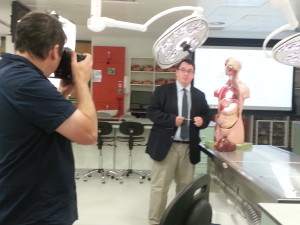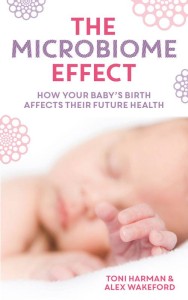What is the human microbiome?
The human microbiome is the body’s microbial ecosystem. In other words, the microbiome is the collective name for the community of trillions of microbes (bacteria, viruses, fungi, archaea and other micro-organisms) that live in and on our bodies.
Microbes are found in our eyes, ears, noses, mouths, lungs, if you’re female inside your vagina, and inside the whole length of your gastro-intestinal tract, from your mouth down to your stomach and all the way through your intestines. The biggest population of microbes are at the end of your intestines, in the colon – that’s where 99.99% of the total gut microbial population are to be found.
You can think of humans as a human super-organism, we’re part human, part microbe. Put in another way, inside your body are trillions of human cells happily co-existing with trillions of microbes.
We have a symbiotic relationship with our microbial friends; microbes play an essential role in our digestion, in our metabolic and immune systems and because of a gut-brain connection, they may even have a part to play in deciding our moods and our personality!

Alex Wakeford filming Dr John Cryan, Professor & Chair, Department of Anatomy & Neuroscience, APC Microbiome Institute, University College Cork
The latest science is indicating that the baby’s microbiome is founded during childbirth – indeed, whether a baby is born vaginally or by C-Section, or whether a baby is breastfed or formula fed, affects the types of microbial species present in the baby’s microbiome. The first species to arrive in the baby’s gut are thought to train the baby’s developing immune system – so which species arrive first could be critical for lifelong health.
Our last film MICROBIRTH, explored the origins of the microbiome and in particular, how the microscopic events happening in the narrow window surrounding birth may have lifelong consequences for the baby’s health. This subject is also explored in our upcoming book, THE MICROBIOME EFFECT (published by Pinter and Martin, release date April 2016)

Front cover of our upcoming book, The Microbiome Effect published by Pinter and Martin, 2016
From birth throughout early infancy, the baby’s microbiome acquires more and more microbes – coming from everything the baby touches or eats, and even from the air in which the baby breathes. Sometime between the ages of 1-3, science indicates that the microbiome stabilises, which means the “baseline” of species roughly remains the same from that point on until a person reaches their 60’s, when the microbiome again enters a period of flux.
It is true that a tiny fraction of bacteria are harmful (known as pathogens), but the vast majority are either harmless or beneficial to humans. The key to good health seems to be the maintenance of a balanced diverse population – so the pathogens are kept in check by the good guys.
But can we alter the microbiome through diet, lifestyle, environment or through supplement intake? That’s the question that will be explored in A PROBIOTIC LIFE.
